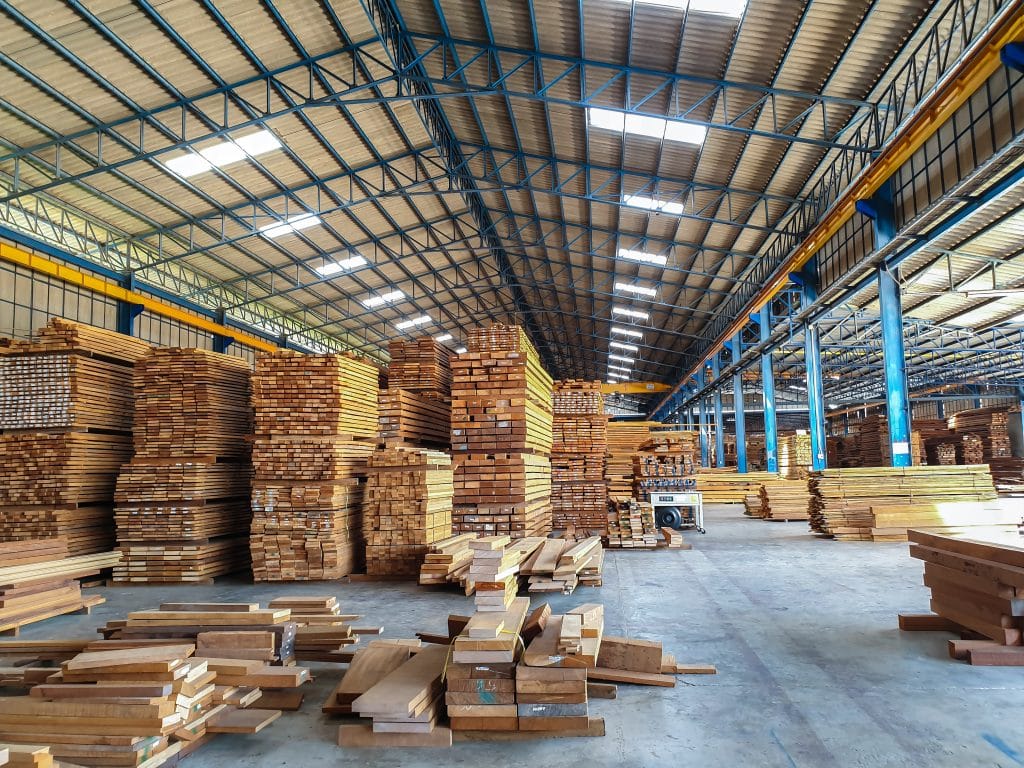The construction industry is feeling its age. Our outdated supply chain just doesn’t work like it used to.
Extended lead times, sluggish shipping, and fluctuating prices lead to big problems for contractors the world over. Schedule delays, cost overruns, and lost revenue is the norm.
But technology is stepping in to solve all that.
Are You Ready To Learn More?
What Are The Effects of Tech On The Construction Supply Chain?
Technology touches every aspect of the built environment. From BIM modeling in the design phase to mobile app-based punch lists at closeout.
For the construction materials market, modern technology acts like a super-powered GPS. That’s because tech gives us a clear view of where everything is and when it will arrive. From the smallest nail to the largest girder, cloud-based technology gives us 360-degree transparency.
Imagine having a single screen where you can see every resource you control, from the bulkiest crane to the tiniest drill bit. That’s what GPS trackers and telematics bring to the table. Now apply that tech to the construction material supply chain and watch out.
How Does Tech Manage Material Flow?
Tech manages the flow of construction materials and equipment inventory with software. These systems track production and transportation from producers to suppliers and out to the job site.
Here’s how it works:
- Real-Time Tracking: Geotagging and GPS systems like SiteSense from Intelliwave Technologies track equipment and materials in real-time. That means everyone stays informed from the moment these assets leave the supplier until they finally arrive at the job site. Transparency like this prevents delays and ensures the right materials are at the right place and time.
- Automated Ordering: For suppliers, modern inventory systems can automatically monitor and reorder materials before supplies get too low. And convenient online ordering systems, like those powered by GoBuild360, make material orders and online sales a breeze.
- Data Analysis: Software connects every aspect of the construction materials supply chain. Beginning with design and estimating software to procurement, e-commerce platforms, project management, and logistics solutions. The data these systems collect helps construction companies identify trends and patterns. And that kind of intelligence helps stakeholders predict future material needs and optimize their resources.
But that’s not all
- Integration with Other Systems: Material management systems integrate with other software systems, like plant automation, logistics, project management, and ERPs. This interconnectivity gives every stakeholder a holistic view of their operation and how they fit into the system.
- Mobile Access: The beauty of cloud-based systems is mobile access. Now everyone from site superintendents to resource managers has easy-to-read dashboards. This immediate access tells them where their equipment, tools, and materials are and exactly when they’ll arrive at the job site. And all this information is available 24 hours a day, seven days a week, on a laptop, tablet, and by mobile device.
By leveraging supply chain technology, construction material suppliers and their contractors can enjoy a smooth and efficient flow of materials, saving everyone time, money, and headaches.
How is eCommerce Tech Changing the Supply Chain Landscape?
The rise of eCommerce is profoundly influencing the construction industry’s supply chain. Large industrial suppliers are increasingly focusing on eCommerce, with companies like W.W. Grainger and Fastenal expecting a significant portion of their sales to come from their eCommerce platforms in the near future.
Contractors are also shifting their behaviors around e-commerce in the construction equipment industry too. Heavy iron heavyweight LIEBHERR turned to Aobe’s Magento e-commerce platform to outfit their spare parts marketplace.
And even the equipment rental industry is refining its e-commerce systems. And why wouldn’t they? 34% of contractors confirm they’ll handle all their rental transactions online in the coming years.
Now let’s take a look at a few more material suppliers modernizing the construction supply chain.
AfriSam
Top Global 100 aggregate, cement, and ready-mix concrete producer AfriSam enters the e-commerce space with their GoBuild360 custom-built ClickToGo ordering platform.
Now AfriSam’s loyal customers have 24/7 account access to:
- Request quotes,
- Place orders,
- Purchase materials, and
- Track their deliveries in real-time.
No more guessing, order errors, back-and-forth emails, follow-up calls, or confusion. AfriSam customers have everything they need at their fingertips.
BuildDirect
The online marketplace provided by BuildDirect.com connects building material suppliers with homeowners and contractors.
With a focus on quality, and affordability, BuildDirect has established itself as a trusted flooring product provider. Backed by industry-leading warranties and support, BuildDirect customers always have the expertise and resources to find the perfect solutions quickly.
Cashbuild
Cashbuild, a major player in the building materials industry with over 335 stores, dramatically spiked its sales after implementing an e-commerce solution powered by GoBuild360. Cashbuild’s retail sales have tripled in just three years’ time, demonstrating the power of e-commerce in the construction materials industry.
What caused such an upward sales spike? For industry leaders like Cashbuild, it’s all about offering their busy customers a simple, easy, and efficient way to shop for building materials 24 hours a day, seven days a week. Proving once again that e-commerce is good for customers and for growing sales.
Chausson Matériaux
Chausson Matériaux, a supplier of construction materials based in France, has an extensive network of over 350 stores that operate across the country. With at least 57 different departments with over 52,000 products, Chausson Matériaux knows that catering to the varying needs of its customers pays dividends. And you can bet their strategy includes making it easy to search, shop, and schedule deliveries any time, night or day.
Ferguson
Ferguson, a company that specializes in plumbing, HVAC, fire protection, and facility maintenance services, understands the power of e-commerce.
By leveraging the convenience and accessibility of a cloud-based platform, Ferguson secures its position as a leader in the industry, ensuring that contractors have everything they need to operate at the highest level and achieve their business goals.
Landscape Hub
Billed as the “One stop shop for your landscape material needs,” Landscape Hub proves that you can sell more products online no matter what materials you provide to the construction supply chain.
And because Landscape Hub hosts their inventory online, they never run out of shelf space or room in their yard. Their online offerings include a wide range of items that cater to their contractors’ different needs.
They carry gloves and tools, bulk and bagged products, and a variety of flowers, grasses, shrubs, and trees.
These leaders make it easy for contractors to order, purchase, and schedule delivery of everything from aggregate, cement, ready-mix concrete, lumber, and building materials, to equipment rentals and excavator parts.
This supply chain tech ensures contractors, homeowners, and commercial work teams always have the gear they need to get things done.
What Does the Future Hold for Supply Chain Management in Construction?
A Smarter Supply Chain
Artificial intelligence (AI) and machine learning are poised to take supply chain solutions to the next level. Remember the struggle of coordinating multiple suppliers, deliveries, and timelines?
AI technology can sift through all that complexity and offer suggestions that make sense. That’s because machine learning can “learn” your business patterns and anticipate your needs, even before you do.
Real-Time Data
Imagine knowing exactly where your materials are in real-time. That’s the power of a GPS and IoT-enabled supply chain. No more guessing if the shipment will arrive on time or if you have enough materials for the next phase.
Real-time data gives everyone in the supply chain the information they need. That means better planning, less waste, and more efficient work schedules.
Blockchain
Blockchain isn’t just for cryptocurrency. This breakthrough technology offers a secure, transparent way to track transactions, which is perfect for supply chain management. All parties can track and verify every material order, delivery, and payment.
This level of transparency can reduce disputes and improve trust between suppliers, manufacturers, contractors, project managers, and project owners.
3D Printing
What does 3D printing have to do with the construction supply chain?
How about this, for starters? Instead of waiting for your supplier to ship materials, you can print what you need on-site.
And in addition to the convenience 3D printing offers, you can reduce storage and inventory costs too. That’s because by printing parts and materials on demand, you need to stage or double handle anything.
But not only that, 3D printing is an additive process. And that means you only use materials when and where you need them. This kind of efficiency could lead to significant material cost savings and waste reduction too.
That’s How Tech Simplifies The Supply Chain
So, there you have it. Embracing technology in your supply chain isn’t just a trend.
With a little bit of tech, you can ditch the guesswork, the delays, and the headaches.
Supply chain tech is about providing busy customers with the materials they need, when and where they need them.
Are You Ready?
The future is waiting. Let’s GoBuild it together.




